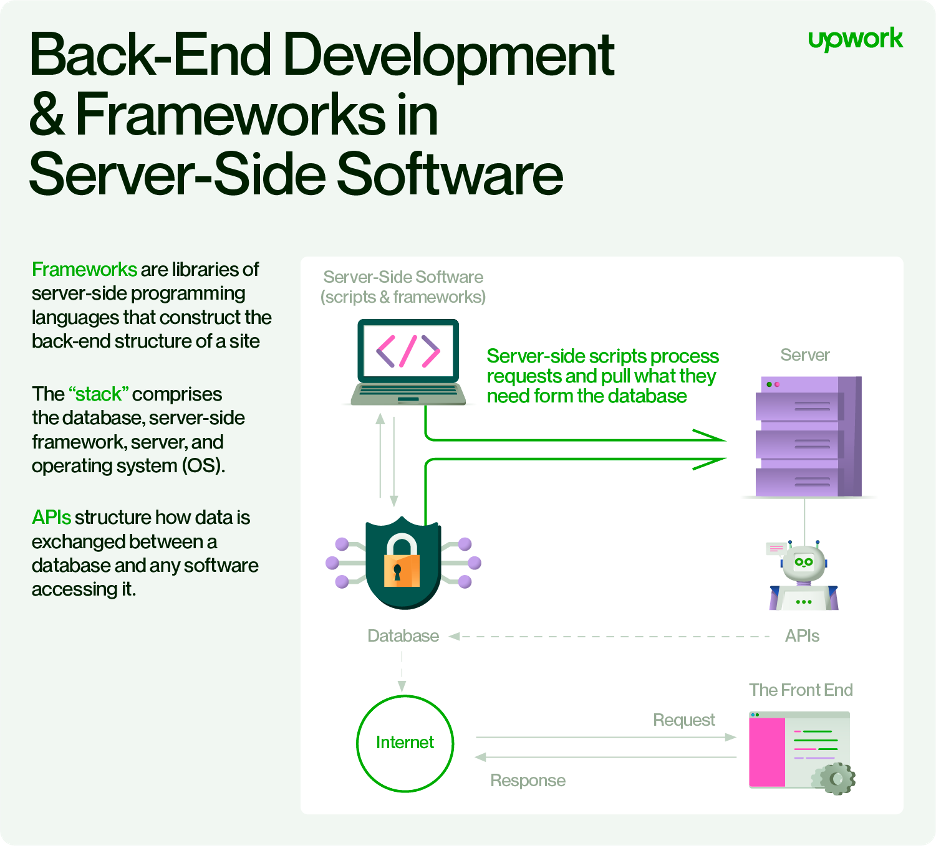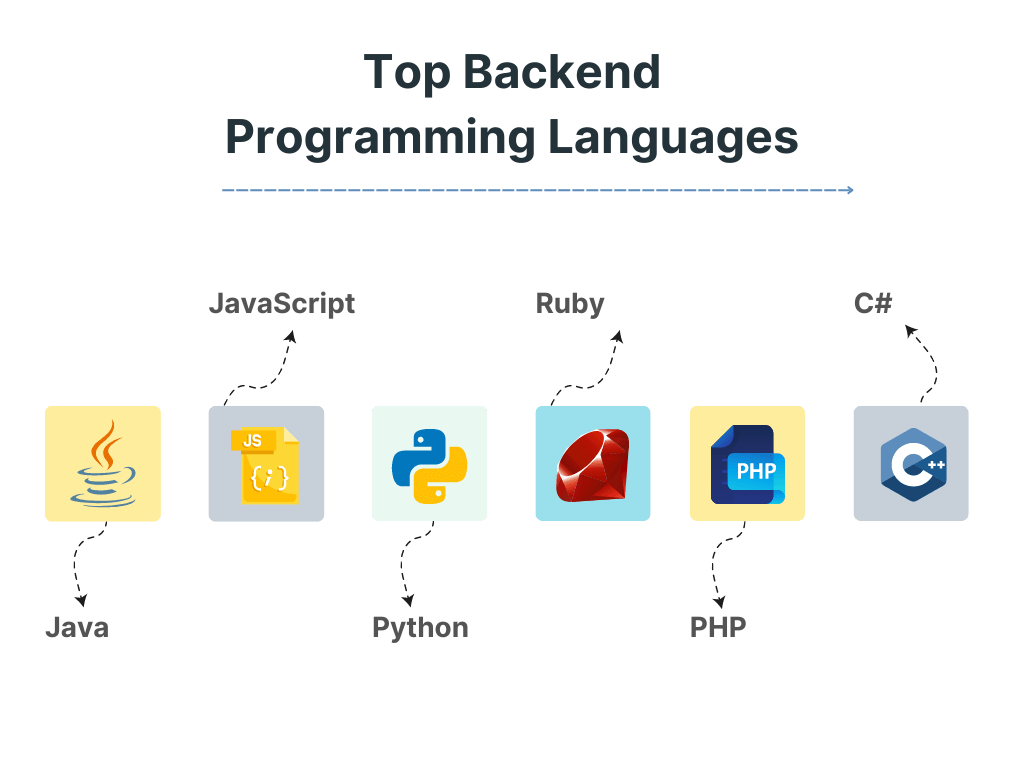Top Back-End Programming Languages for Modern Web Development

Team
web developmentfundamentals
Top Back-End Programming Languages for Modern Web Development
Introduction :
- Have you ever wondered what makes a website actually work when you click a button, submit a form, or log in to your account? While the design you see on the screen is important, there’s a powerful system working behind the scenes that’s the back end.
- The back end of a website is like its engine. It takes care of things like storing data, handling user requests, and making sure everything runs smoothly. And to build this back end, developers use specific programming languages.
- In today’s fast-moving digital world, choosing the right back-end programming language is key to creating fast, secure, and reliable websites or web applications.In this blog, we’ll explore the top back-end programming languages that power modern websites—from small blogs to large e-commerce platforms.
What Is Back-End Development?
- Backend Development involves the logic, database, and other operations that are built behind the scenes to run the web servers efficiently. Backend Development refers to the server-side development of the web application.
- It is the part of the application where the server and database reside and the logic is build to perform operations. It includes the main features and functionalities of the application on the server. Programming languages for the backend are mainly Node. JS (for JavaScript), Python,Java, etc.

What are the Backend Languages?
- Back-end languages are programming languages used to build the behind-the-scenes parts of a website. They run on the server and help with things like saving data, handling user requests (like logging in), and making sure everything works properly in the background.

1. Python
- Python is a highly popular open-source language for backend web development, known for its ease of learning and immediate usability.
- Its extensive libraries and frameworks support advanced technologies like Machine Learning, Data Science, and Artificial Intelligence, making it versatile. It is also well-suited for creating automation test scripts.
- It runs on multiple operating systems, including Windows, macOS, and Linux. It executes code line by line, making debugging easier.
Key Advantages of Using Python
- Python allows developers to write complex logic in fewer lines of code.
- It executes code line by line, making debugging easier.
- Python’s vast standard library supports tasks like web development and data manipulation.
- It runs on multiple operating systems, including Windows, macOS, and Linux.
- Python’s syntax emphasizes readability, reducing maintenance costs.
2. JavaScript (Node.js)
- Node.js or NodeJS is an open-source, cross-platform runtime environment for developing server-side applications with JavaScript.
- It runs on the V8 JavaScript runtime engine and uses event-driven, non-blocking architecture, making it efficient and suitable for real-time applications.NodeJs provides the caching of each module in the application memory, so you don't need to re-execute the code.
Key Advantages of Using JavaScript (Node.js)
- Built on the V8 engine, Node.js executes JavaScript code quickly and efficiently.
- Its asynchronous, event-driven model helps handle multiple connections concurrently without slowing down performance.
- Developers can use JavaScript both on the client and server sides, which simplifies development and improves collaboration.
- Node.js caches modules in memory after the first load, reducing repeated code execution and improving performance.
- The Node Package Manager (NPM) offers access to thousands of open-source libraries and tools for faster development.
3. Java
- Java, a programming language owned by Oracle, is renowned for being object-oriented, platform-independent, and secure. Its syntax is largely influenced by C++. In the Java testing ecosystem, various frameworks like Selenium, JUnit, and TestUnit cater to unit testing needs.
- Java utilizes objects to represent data and methods for manipulation, promoting modular programming and code reuse.
Key Advantages of Using Java
- Java’s “Write once, run anywhere” (WORA) capability, enabled by the JVM, ensures application portability across different platforms.
- Just-In-Time (JIT) compilers enhance performance by converting bytecode into native machine code at runtime, improving execution speed.
- Java is suitable for developing applications of varying scales, from small utilities to enterprise-level systems, ensuring scalability and adaptability.
- Java boasts a mature ecosystem with a wide range of frameworks (e.g., Spring, Hibernate) and libraries that streamline development processes and enhance productivity.
- A large and active Java community provides extensive resources, documentation, and support, making it easier for developers to learn and troubleshoot issues.
4. PHP
- PHP is an open-source scripting language primarily used for developing dynamic and complex websites. It operates server-side, generating dynamic web pages. As an interpreted language, PHP doesn’t require compilation.
- PHP code can be embedded directly within HTML, allowing seamless integration of server-side logic with web pages.PHP runs on various operating systems, including Windows, macOS, Linux, and Unix.
Key Advantages of Using PHP
- PHP is relatively easy for beginners to learn and features straightforward syntax.
- As open-source software, PHP eliminates licensing fees, reducing development costs.
- PHP boasts a vast, active community providing extensive documentation, tutorials, and support.
- Most web hosting providers offer default PHP support, simplifying the deployment process for PHP applications.
- PHP’s ease of use and wide range of tools and frameworks enable rapid development and deployment of web applications.
5. C#
- C# is an object-oriented programming language created by Microsoft primarily for the .NET framework and Windows applications. However, it has expanded its reach and is now utilized for Android, iOS, and Linux platforms as well. It is particularly acclaimed for its proficiency in game and mobile application development.
- C# operates on the .NET framework’s CLR, which provides essential services like garbage collection, exception handling, and resource management.
Key Advantages of Using C#
- C# is first compiled into an intermediate language (IL) and then Just-In-Time (JIT) compiled to native code, resulting in high performance.
- With a rich standard library, powerful integrated development environments (IDEs), and features such as LINQ and async/await, C# significantly boosts developer productivity.
- C# is highly adaptable, supporting a broad range of applications, including desktop and web applications, games, and cloud services.
- The language ensures strong security through features like strong type checking, array bounds checking, and automatic garbage collection, maintaining application integrity.
Delivering Powerful Web Experiences with Modern Back-End Technologies
- At our company, we build fast, secure, and reliable websites using proven back-end technologies like PHP and Next.js. We focus on practical, scalable solutions that help our clients succeed online. Whether it's a dynamic business site or a feature-rich platform, we ensure every project is built with clean code and strong performance in mind.
- Our team works with leading content management systems including WordPress, Drupal, and Craft CMS, allowing us to deliver customized, flexible websites that are easy to manage and designed to grow with your business.
- By combining technical skill with a passion for web development, we bring your ideas to life. Partner with us to build and launch websites that not only look great ,but perform exceptionally.

Fueint Team
Team
Fueint Team is a Team at FUEiNT, contributing expert insights on technology, development, and digital strategy.
